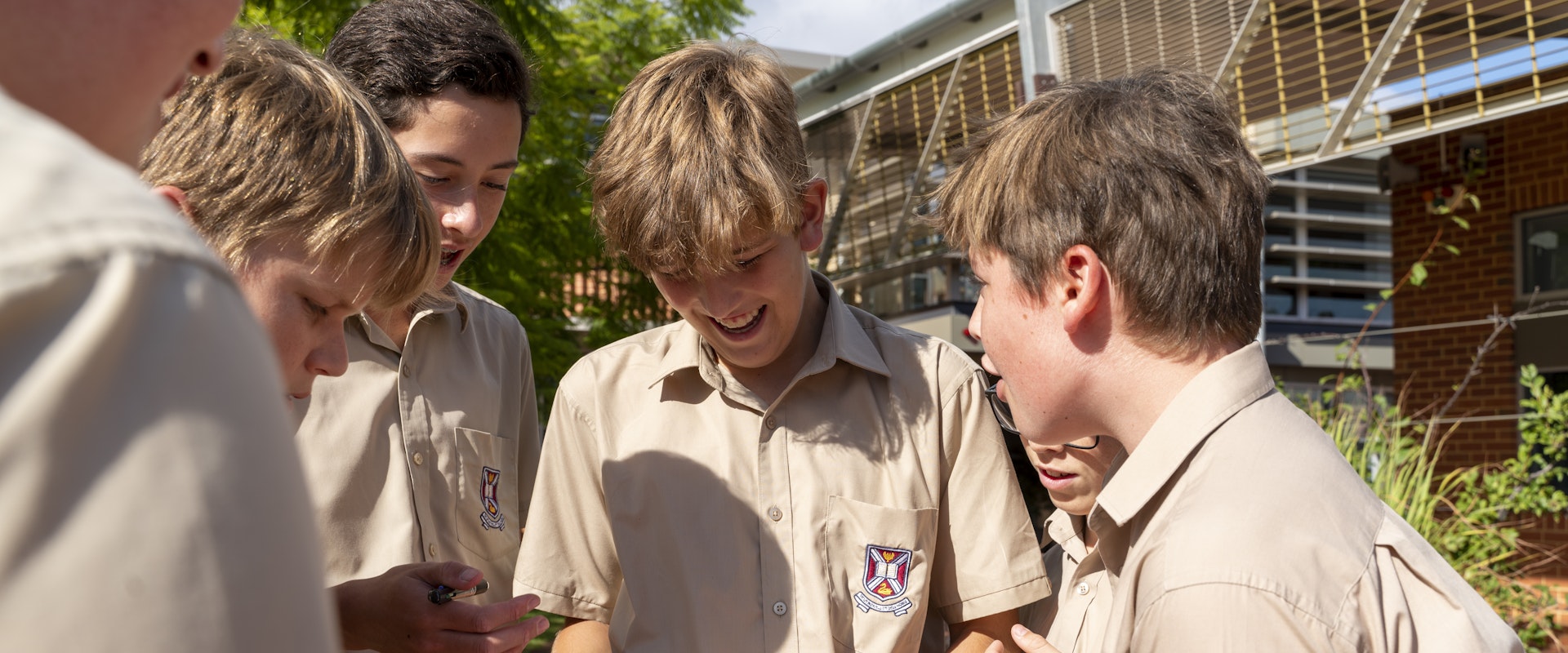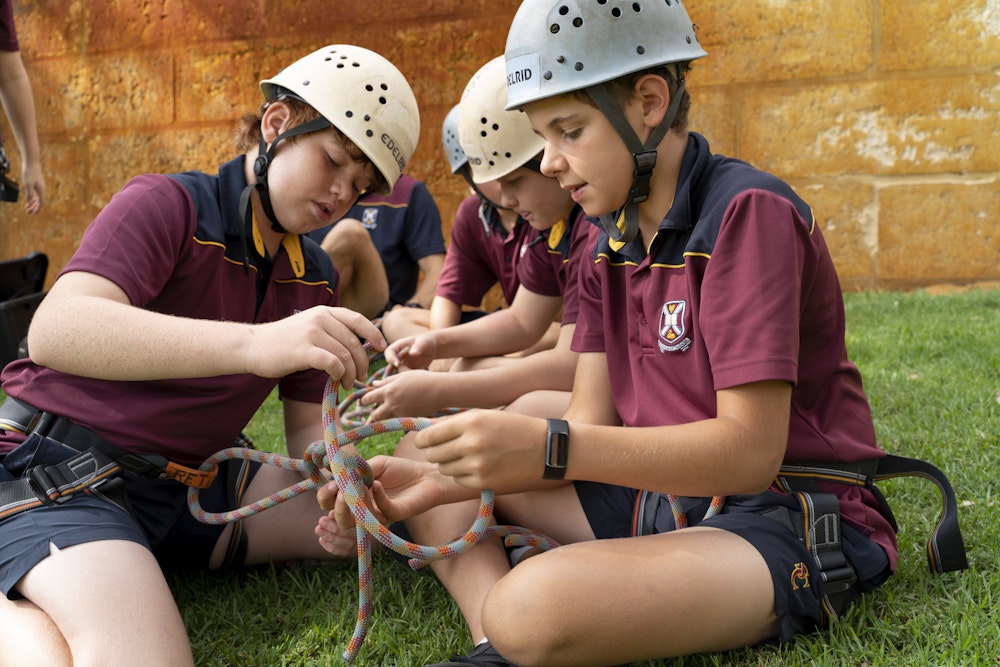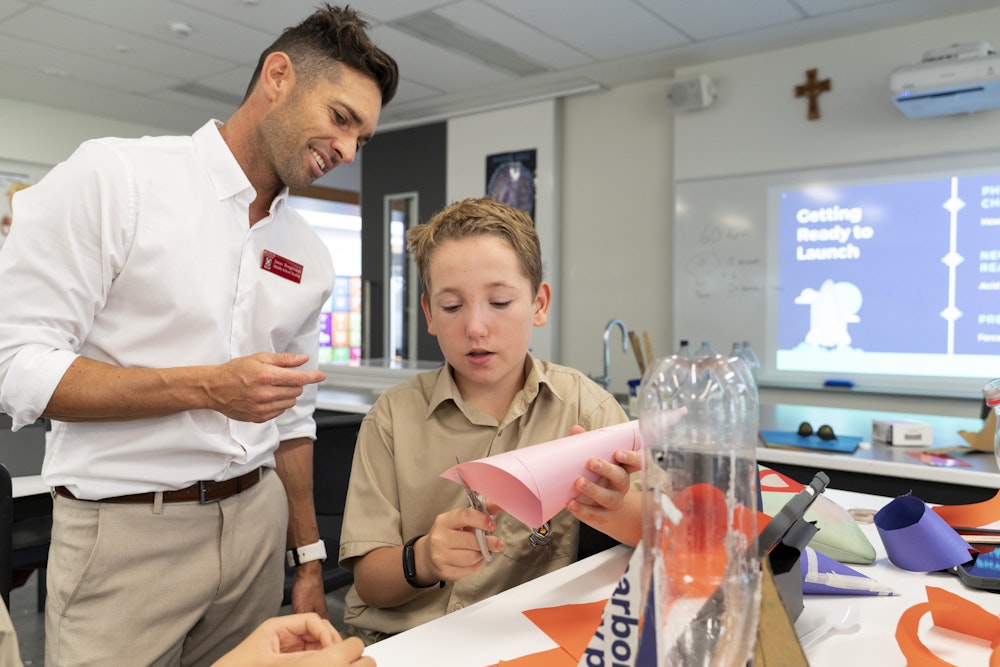Teaching and Learning
The Middle School teaches the Australian Curriculum and is delivered within the framework of the International Baccalaureate Middle Years Programme.
The focus in the MYP is on concept-based learning and developing the transferable skills described in the Approaches to Learning.
In Year 8 the Community Project is a collaborative project that presents boys the opportunity to demonstrate their knowledge, communication, research, thinking and social skills as a culminating experience of the MYP.
View our Teaching and Learning website
Co-Curricular
Co-curricular opportunities add a richness that boys can elect to take part in. From before and after school homework clubs to participating in full scale drama productions, musical concerts or community service activities. Chess Club, Ceramics Club, King of the Courts and Philosophy Club hint at the range of creative thinking and challenging opportunities on offer each term.
Community and Service
The Community and Service programme at Scotch has evolved over decades of engagement by boys in a multitude of service activities. Service action is facilitated through partnerships with agencies and encouraging boys to seek out individual opportunities to serve, giving tangible expression to our Christian values.
From Kindergarten to Year 12, boys have access to service activities framed around the Scotch Service Model cornerstones: Nurture; Inspire; Sustain; and Connect. Service is at the heart of all three International Baccalaureate programmes, and central to our school motto of 'Preparing Boys for Life' - a life of servant leadership.
In Middle School boys are provided opportunities to serve through class activities and service clubs. Boys are encouraged to initiate service action and take a leadership role in managing activities.
Examples of service activities in Middle School include:
- Fundraising for Dunally School in Tasmania which was destroyed in a fire
- Making dolls for Uthando Orphanage in Zimbabwe
- Collecting clothing and food for the homeless
- Performing music at aged care facilities
Pastoral Care and Wellbeing
The wellbeing of students in the Middle School is developed and managed through our pastoral care programs and is built upon the concept of recognising and respecting the rights of others.
Underpinning the pastoral care culture of Middle School is the Home Room and Home Room teacher structure. Each student has a Home Room teacher who has the most significant pastoral care responsibility for the boy. Class by class generated Essential Agreements provide an agreed guiding framework for expectations and behaviour.
Supporting the Home Room teachers in the area of Wellbeing and Pastoral Care are Year Level Coordinators, Chaplain, Psychologist and Deputy Head of Middle School, with oversight of Wellbeing and Pastoral Care throughout the College.
The wellbeing of our community is a priority of the College.
Sport and Outdoor Education
Sport is a valuable component of the secondary school programme at Scotch College. The School recognises the need for every boy to participate in sport and places a strong emphasis on participation as well as performing to individual potential. Participation is crucial to a student's development. All boys have access to the School's renowned sports playing fields and recreational facilities.
In addition to the Physical Education programme the boys from Years 5 to Year 12 choose a seasonal sport. There are a great range of sports to choose from including Basketball, Cricket, Rowing, Swimming, Water Polo, Volleyball, Tennis, Sailing, Strength & Conditioning (Year 11 & 12), Badminton, Cross Country, Football, Hockey, Rugby, Soccer, Triathlon, Touch, Golf and Surfing.
All boys participate in Swimming, Cross-Country and Athletics and take part in Inter-House and Inter-School competitions throughout the year.
Information Learning Technology and Libraries
The Scotch Library and Information Learning Technology departments form a strategic partnership to create an environment at Scotch that provides each boy with access to the most up to date information through the most suitable technological tools for learning. Through common goals each department supports the boys on a daily basis with dedicated teams delivering a rich curriculum.
For students in the Middle School, the library builds on the foundations of the Unit of Inquiry, which explores the personal aspects of students through the Primary Years Programme. The Middle Years Programme begins to lead students beyond the personal to local and international communities, and it is the library's role to maintain links to resources delivering differing levels of complexity for your son to access for his classes and his own personal interests.
Years 6 and 7
Students in Years 6 and 7 have a timetabled library period directed by the teacher librarian and the classroom teacher. Both are present in the library while the lesson is delivered and play co-operative roles in the delivery and support of the lesson content. These lessons are based on the scope and sequence to teach students research techniques while encompassing the general competencies that are a part of the Australian curriculum.
Year 8
Year 8 students do not have a dedicated library period; rather the library is involved in lessons by accommodating requests for research guides which the teachers deliver inside their normal classroom. The boys do have dedicated borrowing periods where teachers bring them to the library to borrow new books and to discuss their reading with the teacher librarian. This represents the start of a change in the operations of the library as this is the same methodology in the Senior Library.
Device use
In the middle years, your son's use of technology increases with greater emphasis on personal use and organisation while using his device. This is a critical time for your son to develop understanding of his role in a digital world and the expectations and responsibilities that come with being a digital citizen.
Throughout his day, he will be required to have his iPad and Apple pencil as a tool for learning in Year 6 and Year 7. In Year 8, he will use his laptop to access his curriculum courses. The vision for digital learning at Scotch College is focused on a connected, collaborative and creative curriculum afforded by the use of technologies when relevant to the learning experience.
Digital technologies are seamlessly integrated with tradition methods of teaching and learning and as a tool to transform learning possibilities. There are a variety of possibilities throughout each day in different subject areas that involve video, audio, sketch-noting, design and research skills.
As an Apple Distinguished School, we are committed to the Apple ecosystem that we believe provides the best overall experience for learning.
View our Teaching and Learning website
Specialist facilities
Specialist facilities in the Middle School include integrated academic support classrooms, a dedicated food technology centre, design technology workshops, French and Indonesian Language classrooms and music studio and practice rooms all overlooking our expansive College ovals. Year 7 and 8 boarders live in the Year 7 and 8 boarding House also known as Anderson House. The Middle School buildings border a central grassed quadrangle that provides a centre for boys to meet, socialise and play.
Academic Extension
For boys of high academic ability, we offer a range of targeted, differentiated and innovative educational programmes. These are designed to empower boys to realize their potential and harness their talents towards making a positive contribution to the global community.
Being accepted into an enrichment opportunity requires the student to be able to manage the normal curriculum and, at times, be withdrawn from classes or attend before school and after school sessions.
The Enrichment Programme in Years 6–8 is overseen and coordinated by an Enrichment Programme Coordinator in conjunction with the Middle School Dean of Teaching and Learning.
Academic Support
The role of Academic Support in the Middle School is to initially identify boys with special educational needs who are not achieving at year level or those boys with gaps in their knowledge and understanding, who would benefit from smaller classes in English and/or Mathematics. Analysis of Orientation Day Academic Assessment Services test results, NAPLAN results, school reports, reports from external specialists as well as parent information is used to determine students requiring additional support.
Scotch College Middle School caters for these students through the option of attending smaller Mathematics or English classes. These classes are limited to ten students in Year 6 and 14 students in Years 7 and 8. The classes run at the same time as mainstream classes on the timetable.


